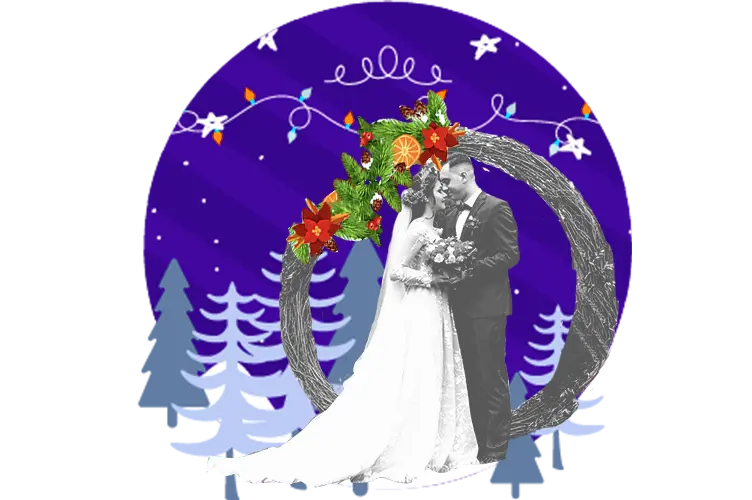
Always fantasized about a June wedding? Want to honor someone you love by getting married on their birthday? Want a religious or non-religious ceremony on a specific or important day? When it comes to picking a wedding date, you and your bride likely have no shortage of ideas.
While brainstorming is fun, your wedding date can set the tone for your ceremony and shouldn’t be chosen lightly. The date you select must make sense given your other wedding plans, like an outdoor ceremony or destination wedding.
When choosing your wedding day, consider your wedding aspirations and budget. These tips can help you pick the perfect date to say “I do.”

Most couples will need at least six months to plan a wedding, but that’s really the bare minimum. Usually, couples dedicate at least a year (sometimes multiple years) between the proposal and the ceremony to planning their wedding. Learn more about why couples are staying engaged longer and longer before getting married.
Choosing a date between 6-18 months in advance should give you plenty of time to plan the wedding and give your guests ample time to make arrangements to attend.
If you work with a wedding planner, you may be able to pull off an elaborate wedding in a shorter amount of time. But unless there’s a good reason you’re rushing to the altar, scheduling your wedding a year or more in advance can reduce your stress and allow for more careful planning.

Each season offers a unique flavor that can affect the style and mood of your big day. Scheduling your wedding for peak wedding season (aka May-October) may be your instinct, but wedding personnel like photographers and florists are in high demand these months, and your dream venue may already be booked.
Explore the benefits of each season before you choose your wedding date.
Winter: If you plan to be married indoors winter is the season for you. The lower popularity of winter weddings means more available venues and lower costs for you. Plus, the venues are already decorated for the holiday season, meaning it’s one less thing you have to pay for. Decreased post-holiday travel costs make winter an ideal season for destination weddings with many out-of-town guests.
Fall: The cooler temperatures and less direct sunlight of fall make the season ideal for weddings with indoor and outdoor components. An outdoor ceremony during the day with an indoor reception for when the temperatures drop in the evening sounds pretty nice, right?
Summer: The ideal season for the outdoor wedding experience. Additional benefits include more floral availability, more hours of sunlight, and a natural tan in your wedding photographs. Your guests may have more flexible schedules during the summer too. John Anderson, co-founder and executive editor of Life Line Wedding, wants to remind you that, “Summer is known to be the priciest and most popular option, so plan accordingly.”
Spring: Spring is all about freshness and new life, making a spring wedding ideal for celebrating the new life you will share with your bride. Just remember to have an indoor backup option in case of rain.
Saturdays are the most popular day of the week to get married since Saturday weddings don’t conflict with most work schedules and can make travel arrangements easier for your out-of-town guests. But don’t discount the Sunday – or even a weekday wedding.
Tying the knot during the week can mean considerably lower wedding costs.
Mondays offer the lowest overall costs, and each weekday gets marginally more expensive as the weekend approaches.
The downside? Many government holidays fall on a Monday, leading to issues like long-weekend traffic and fully-booked hotels. Many people plan their long weekends in advance, so if you opt for a Monday, send your save-the-dates on the early side.
Some couples plan their wedding for a specific date that is significant to their relationship. This could be the day you met, the day of your first date, or your anniversary.
Some couples choose a special date that honors a loved one or couple who has been influential to their relationship, like a birthday or anniversary.
If you’re planning an LGBTQ+ wedding, you may want to pick a date that is important to the LGBTQ+ community. You can schedule your wedding to fall during June in honor of pride month or on Bisexuality Awareness Week in September. Having your wedding on the International Transgender Day of Visibility (March 31) is a way to show support for the trans community.

Some people schedule their weddings for the holiday season when everyone is already in a festive mood. If you get married around Christmas or New Year’s Day, you don’t have to work too hard to create a celebratory atmosphere.
Many holiday weekends have three days, facilitating easier travel, particularly for destination weddings.
However, many of your guests likely have preexisting holiday plans or want to spend their vacation time with their families. It may also be more challenging to secure a venue during the holidays.
If you know you or your future wife have busy periods at work at certain times of the year, narrow out those periods immediately. Wedding planning is time-consuming, and splitting your time between your job and your wedding commitments will be more challenging as the day approaches.
In other words, if your bride-to-be is a tax accountant, don’t get married during tax season.
You should also consider any religious obligations. Many faiths have religious days of rest, which are considered off-limits for large events like weddings. Check with your place of worship to see if there are any restricted wedding dates in your faith.
Weddings lose a bit of their magic without loved ones present, especially the parents and close relatives of the bride and groom.
If you are stuck choosing a wedding date, it may be wise to speak to close members of the guest list and get some input. You don’t have to completely cater to their preferences, but it could help you eliminate some days as options.
Sometimes, it can be easier to work backward when selecting a wedding date, especially if you have a few specific wedding venues in mind. If the venue is more important to you than the exact date, you should work with that particular venue to see what dates they have available.
It can also be wise to work with any vendors that are important to you or your bride, such as a specific caterer, florist, or photographer. Compare schedules with your must-have hires, so you don’t schedule your wedding for a date they already have booked.

Ultimately, you should choose a date that feels right to you and your partner. Work together with your bride-to-be, and you will eventually settle on the perfect date.
You do not have to be a wedding planner (or even hire one) to have your dream wedding, but choosing the date of your ceremony should not be taken lightly.
At The Groom Club, we’re here for the groom from proposal to honeymoon. Feel like you’re not helping your future wife enough with planning? Here’s how to get involved. Stumped on bachelor party ideas? We’ve got you covered.
For all our wedding tips for the groom, visit The Groom Club or subscribe to our mailing list for more TGC content.